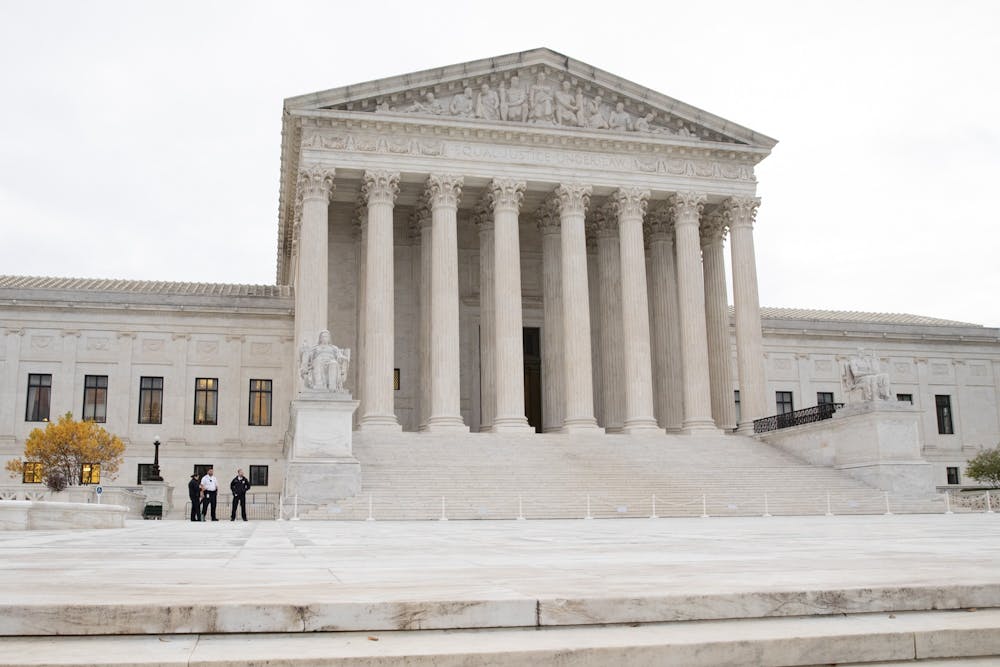The theory was raised by former President Donald Trump and his allies as part of efforts to overturn the results of the 2020 presidential election.
The Elections Clause in the U.S. Constitution is important to the independent state legislature theory and came up several times during oral arguments on Wednesday.
It states, “The Times, Places and Manner of holding Elections for Senators and Representatives, shall be prescribed in each State by the Legislature thereof; but the Congress may at any time by Law make or alter such Regulations.”
This theory says that legislators would be free to have full control without state court intervention regarding federal elections.
"This is a theory with big consequences," Justice Elena Kagan said on Wednesday.
Arguments
David Thompson, an attorney representing the petitioners, argued that the legislature has "unlimited" power in prescribing elections.
In an argument that the founders of the nation wanted state legislatures to have full discretion over federal elections, he cited a Federalist Paper written by Alexander Hamilton
“For the first 140 years of the Republic, there was not a single state court that invalidated, on substantive grounds, any congressional redistricting plan,” Thompson said.
Chief Justice John Roberts asked Thompson about the governor's ability to veto measures passed out of the legislature. Thompson acknowledged that the governor retains the authority to veto election legislation.
Roberts said allowing the veto of those actions by the legislature "significantly undermines the argument" that the state houses have the power to do what they want.
During Thompson’s arguments, Justice Sonia Sotomayor said the Republican legislative leaders are attempting to “rewrite history” to favor their argument.
To get the day's news and headlines in your inbox each morning, sign up for our email newsletters.
Kagan argued that the independent state legislature theory could allow state legislatures to enact voter restrictions.
"I think what might strike a person is that this is a proposal that gets rid of the normal checks and balances on the way big governmental decisions are made in this country," she said. "You might think that it gets rid of all those checks and balances at exactly the time when they are needed most."
Thompson said his argument concentrates on not allowing state courts to impose substantive regulations on a state legislature.
Neal Katyal, an attorney for Common Cause and former acting U.S. solicitor general, argued that courts, since the nation’s founding, have not read the Elections Clause the way Thompson has.
"I'm not sure I've ever come across a theory in this court that would invalidate more state constitutional clauses as being federally unconstitutional," he said.
Justice Clarence Thomas asked Katyal where the North Carolina Supreme Court draws authority to be involved in federal elections.
Katyal responded by noting the similarity of the case to Smiley v. Holm, a 1932 case that held the U.S. Constitution does not forbid a governor from vetoing a redistricting proposal passed by the state legislature.
"For 233 years, this court's never gotten involved and said, 'Hey, we're going to rove say the North Carolina Court got it wrong or their provision was too abstract for enforcement or anything like that.'" Katyal said.
U.S. Solicitor General Elizabeth Prelogar argued on behalf of the Biden administration and opposed the independent state legislature theory. Specifically, she said it would "sow chaos on the ground."
She warned that adopting the state legislature's arguments would lead to federal courts being flooded with lawsuits around elections.
Case outcome
Justices Samuel Alito, Neil Gorsuch and Thomas have all indicated levels of support for the legislature’s argument. Justices Sotomayor, Kagan and Ketanji Brown Jackson were all critical of the legislature’s arguments.
After three hours of arguments, it appeared that Justices Brett Kavanaugh, Amy Coney Barrett and Roberts might be the deciding voices in the case.
On Wednesday, Barrett voiced confusion over the N.C. GOP legislature leaders’ argument multiple times. She said it didn’t seem to square with past precedent.
If the court decides in favor of state GOP leaders, it will undercut what Roberts has argued in previous cases. In Rucho v. Common Cause, a 2019 case decided by the U.S. Supreme Court, Roberts wrote that rulings on partisan gerrymandering were beyond the reach of federal courts.
The court is expected to release its decision next summer.
@emmymrtin
@DTHCityState | city@dailytarheel.com
Emmy MartinEmmy Martin is the 2023-24 editor-in-chief of The Daily Tar Heel. She has previously served as the DTH's city & state editor and summer managing editor. Emmy is a junior pursuing a double major in journalism and media and information science.





